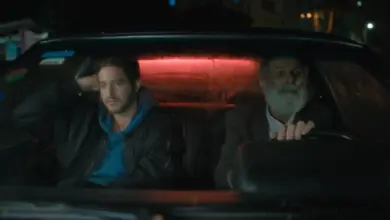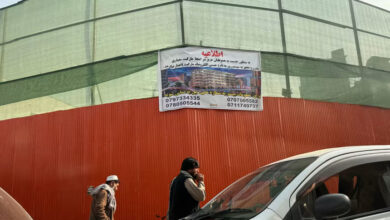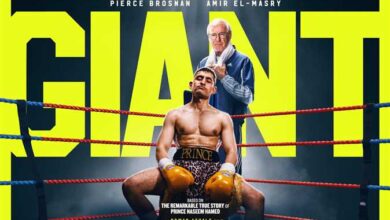The seventh Culturewheel Festival for Short Feature Films came to an end on Thursday. The intense three-day program featured 49 films representing various cinema organizations, including the High Institute for Cinema, the Ministry of Culture and the Alexandria library.
The award for best actor was split between Sameh Ezzat for "El-Bab El-Mwareb" (Partially Open Door), which explores the relationship between two neighbors, and Alaa Hasan for "Mosadas Maiya"(Water Pistol), which follows a young man in his quest to find a bathroom in Cairo.
The award for best actress was a tie between Salma Said and Fatemah Adel in "Rabie 89" (Spring of 89), a film about the end of a friendship and the beginning of adolescence for two teen girls. Best editing was handed to Ahmed Hafez for his film "Del Ragel" (A Man’s Shadow) which deals with gender issues. Best cinematography went to Wael Darwish. The bronze award went to "Terahen" (Do You Want to Bet?), which explores life and death through a chess game between two strangers whose bets change their destinies. The silver award went to director Hisham Emara for his film "El-Bab El-Mwareb." Director Tamer Mahdy took the gold for "Del Ragel."
"Rabie 89," written by Wissam Seliman and directed by Aiten Amin was among the festival’s entries that really stood out. The film takes viewers into the lives of two classmates in their early teens whose friendship is at stake when they start the long, hard journey of adolescence. In a delicately woven plot, the writer successfully exlores the fine line between dreams and reality in the late 1980s where telephones, letters and photos are the only means of communications between two friends growing up and growing apart. Playing on a nostalgic note, the film narrates those moments we hide even from our own diaries.
Another standout film was "Qarar Izala" (Abolition Permit), directed by Mohsen Abdel Ghani, about a young girl’s failed attempt at hair removal. The girl is discreet as her nosy neighbor keeps hinting that she smells something funny (the burning of sugar and lemon, the essential ingredients of hair removal). Her act is cleverly suggestive of sexuality and adulthood, and represents a taboo for adolescent girls living in a complex society that gives little room for self-discovery. "El-Shater Amr" (Amr, the Good Boy) looks at the idea of free will symbolized in a young boy’s life where he does what he is told and usually listens to the voices in his head until he realizes he has a choice.
Despite these standout selections, this year’s festival was quite disappointing. With the exception of a few films, the crashing majority reflect poor quality and taste as well as shallow, redundant ideas that belong to the early 20th century. Violence against women is a central theme in many of the films. From a woman whose husband divorces her and unjustly takes custody of their child in "Aqal men Saa" (Less than an Hour), to the sexual addiction of a tyrannical husband who subjects his wife to emotional and physical abuse in "Wafaa" (Wafaa), the films address this theme heavy-handedly. The films disappoint rather than engage their audiences, as they portray violence against women with the didacticism of an academic report.
Most of the films explore dark thoughts that range from family massacres to rape and suicide. This makes one wonder whether the films reflect the depressed state of young filmmakers or mere artistic laziness that relies on audiences’ sympathies, despite the dullness of most of the plots. In a highly exaggerated dramatic style, "Ana" (Me) depicts a "good" twin brother who no longer endures the insults of his twin who killed their mother. Consequently the "good" twin kills his brother and then commits suicide. The drama drags on in "Taam el-Lemon" (Taste of Lemon) where the protagonist’s yearning for his dead daughter throws him into the arms of his best friend’s teenage daughter, whom he impregnates and causes to die as a result. Another major theme is repentance, where young protagonists fall into typical temptations due to peer pressure, and therefore disobey their parents.
For those who manage to escape the main themes, ambiguity prevails. These films raise many ideas, but with no clear plots. Perhaps this reflects confusion on the part of young directors. In "Saateen fi Youm Aadi" (A Couple of Hours in an Ordinary Day) the main characters, unaware that they are related, wander aimlessly, until we miraculously, like in any classic Indian film, realize they are related (through a black and white photo of them when they were kids). Meanwhile we are puzzled by a clown who roams the empty streets on a bicycle, while one of the characters is murdered for no apparent reason. Questions like "who is that?" and "what’s going on?" seem rhetorical despite the aimless and prolonged narrations and the vague ideas that lead to more ambiguity.
Narration, repetition of scenes and direct, weak dialogues are not enough. Some of the movies, imitating television dramas, end with songs whose lyrics summarize the moral of the story, lest the audience try to think for itself. Most such films shy away from any shred of symbolism or nuance, and experiment with none of the essential and basic cinematic tools, including close-ups.
With a few exceptions, lots of good ideas were wasted despite good intentions. This raises real and alarming questions regarding the future of Egyptian cinema.




